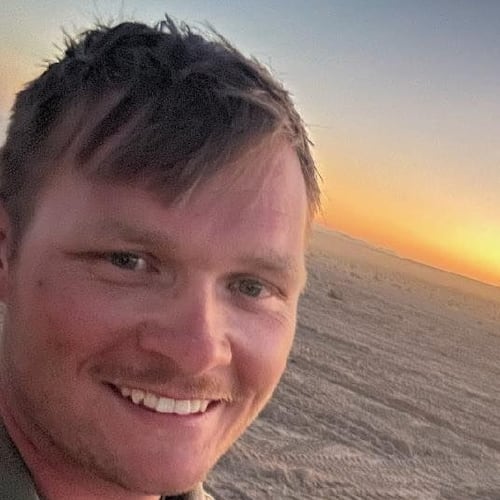One of two patients infected with Ebola virus is expected to arrive at Emory University Hospital's isolation unit on Saturday.
Dr. Bruce Ribner, an infectious disease specialist, told a room packed with reporters Friday that though there is no cure for Ebola, improving the patients' level of care may markedly increase their chances of surviving.
"The body has to be given a chance," he said, "to live long enough to kill the virus." Accurately monitoring their level of hydration and watching for bleeding are part of that effort, he said.
Ribner said there was no reason for the public to be concerned.
"We do not believe there is any likelihood at all" of a secondary infection, Ribner said. He also said he is not concerned as a health care worker about being infected while caring for an Ebola patient, as the patients themselves apparently were.
"I have no concerns" about that, he said.
Both patients will pass through Dobbins Air Reserve Base in Cobb County. The workers, Dr. Kent Brantly and missionary Nancy Writebol, remain in critical condition, North Carolina-based relief group Samaritan’s Purse said in a statement.
They will be treated in a separate isolation unit at the hospital. Located away from patients, the small room has two beds and special air filters, an Emory spokesman said. It’s one of only four such units in the nation.
Flying Americans home after contracting diseases in foreign countries is not new.
Special resources were used in both the SARS outbreak of 2002 and the Marburg Viral Hemorrhagic Fever outbreak in Angola in 2009 to bring Americans back to the states while still protecting the community at large, according to the U.S. Department of State.
“The safety and security of U.S. citizens overseas is our highest priority,” the agency said in a statement. “These are U.S. citizens who are returning to the United States for medical care. They are being returned under strict medical protocols for infectious diseases.”
As did Dr. Ribner, both the State Department and CDC have emphasized that bringing the Ebola patients to Atlanta does not pose a risk to the public. Ebola is not transmitted through the air. Instead, it is passed through bodily fluids.
CDC spokeswoman Barbara Reynolds noted that over the past decade there have been five cases in the U.S. of people who suffered from other types of hemorrhagic fever, not Ebola, and were successfully treated without any secondary transmission.
“The health care system worked,” she said.
News of the Atlanta connection arrives as the Ebola outbreak continues to worsen in Guinea, Sierra Leone and Liberia. The death toll has now surpassed 700, and Sierra Leone’s president on Thursday declared a state of emergency, sending security forces house to house looking for people exposed to the disease. The outbreak so far has killed 60 percent of the people infected.
“This is a tragic, painful, dreadful, merciless virus. It’s the largest, most complex outbreak that we know of in history,” CDC director Thomas Frieden said in a news briefing.
He said it may take up to six months or longer to suppress the outbreak. There is no known cure for Ebola, which is characterized by sudden onset of fever, profound weakness, muscle pain, headache and sore throat. This is followed by vomiting, diarrhea, rash and, in some cases, both internal and external bleeding, according to the World Health Organization.
Minimal threat to U.S.?
Although this Ebola outbreak is the most virulent on record, experts on the virus expressed little concern that the virus would spread to other continents.
Agence France-Presse interviewed Dr. Peter Piot, co-discoverer of the virus and head of the London School of Hygiene and Tropical Medicine, who said there was little risk of a wider outbreak.
“Spreading in the population here, I’m not that worried about it,” he told the news agency.
“I wouldn’t be worried to sit next to someone with Ebola virus on the Tube as long as they don’t vomit on you or something,” he said, referring to London’s underground train system. “This is an infection that requires very close contact.”
Ebola is spread through contact with bodily fluids and is not transmitted through the air, as with flu or other illnesses.
The New York Times reported that the International Air Transport Association also was playing down the hazards outside West Africa. The association, which represents most major airlines, said in a statement Thursday that the WHO had not recommended travel restrictions or border closures.
“In the rare event that a person infected with the Ebola virus was unknowingly transported by air, WHO advises that the risks to other passengers are low,” the statement said.
Ebola is spread only by people with severe symptoms, it said. “It is highly unlikely that someone suffering such symptoms would feel well enough to travel.”
American aid workers
Samaritan’s Purse, the Texas charity that employs Brantly, said on Thursday that an experimental serum arrived in Liberia Wednesday.
“But there was only enough for one person,” said Franklin Graham, president of Samaritan’s Purse, said in a statement on the organization’s website. “Dr. Brantly asked that it be given to Nancy Writebol.
“However, Dr. Brantly received a unit of blood from a 14-year-old boy who had survived Ebola because of Dr. Brantly’s care,” Graham said. “The young boy and his family wanted to be able to help the doctor that saved his life.”
The site said both patients are in stable but grave condition, and Brantly “took a slight turn for the worse overnight.”
Meanwhile, quoting an unidentified source, CNN reported that a medical charter flight left Cartersville Thursday to evacuate the two Americans from the Liberian capital, Monrovia.
This article drew on reports from the Associated Press, the New York Times and Agence France-Presse.
Email staff writers Misty Williams or Ariel Hart.
About the Author
Keep Reading
The Latest
Featured
